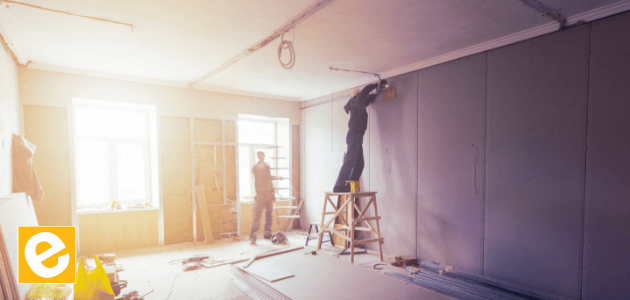
Standardizing Business Processes for Drywall Subcontractors
Table of Contents
What is a Drywall Subcontractor
Drywall subcontractors are responsible for applying drywall to walls or ceilings and play an important role in the majority of commercial construction projects. Drywall subcontractors must, therefore, be able to read and understand design blueprints, estimate the number of wallboard materials necessary, and identify the locations of essential accessories such as windows, outlets, and plumbing. Drywall installers can also attach wallboards to create new walls in a building or remodeling process.
Since drywall subcontractors work in the latter stages of a construction project, they must effectively communicate with other workers on the job site regarding delays or changes to the scope of the project. By standardizing their business practices, drywall subcontractors can ensure that their part of the construction project is integrating with the other and is delivered both on time and within scope.

Why Standardization is Useful
Standardization has long since been a useful tool in construction to reduce both the time and cost of building projects. Standardization helps reduce the chance of errors being made and can make it easier to pinpoint and fix a mistake. By helping minimize variation in the final result of a product, standardization streamlines the construction process for better efficiency and accuracy.
There are several additional proven benefits to standardization, such as improving clarity between workers by eliminating the need for time-wasting guesswork. Standardization also helps boost productivity levels and ensures a standard level of quality of work. Therefore, using standardization can make choosing a particular subcontractor much more appealing. By decreasing the ambiguity in a project, standardization helps subcontractors spend less time figuring out details of their work and allows them to spend more time doing the work.

Sustainable Drywall Subcontracting
Drywall subcontractors that are LEED-certified (leadership in energy and environment design) are especially in demand because of the push for renewable or eco-friendly construction that supports energy-efficient processes. Using tools such as insulation, drywall subcontractors can help reduce the need for additional energy consumption in the form of HVAC technology. Insulation is a large part of a drywall subcontractors job scope and can serve as thermal control for the building if installed correctly.
Environmentally friendly drywall technologies, which are becoming increasingly popular, include a high percentage of either recycled or green materials which are less harmful to the environment. The most critical factor in this is R-value, which measured heat flow resistance. A higher R-value is an investment for building projects because it results in long-term energy saving. Due to its high insulation ability, a high R-value means keeping warm air in during colder weather and hot air out during the heat.

Standardization in Drywall Subcontracting
Measuring, cutting, and placing drywall sheets can be considered the most physically active part of drywalling. The phrase “measure twice and cut once” rings especially true for drywall subcontractors because they need to ensure each piece of drywall is measured correctly to minimize the number of wasted materials. After this, the final step of drywalling is finishing, which ensures the edges are smoothed over and ready to be painted or wallpapered. This step can be very time-intensive, and therefore needs to be done accurately using tools like joint compound tape and careful sanding. By standardizing these processes, drywall subcontractors can minimize material waste and wasted labor hours for the job.
As drywalling is one of the later steps in a construction process, it is not uncommon for a project to be running behind schedule by the time a drywall subcontractor begins their work. Because of this, documenting delays and lost labor hours (e.g., in a daily report) is critical for drywall subcontractors to ensure communication between the subcontractor and project manager, and prevent the risk of being unpaid.
Drywall subcontractors need tools for standardizing their business practices such as being able to record meeting minutes and document notes and two-way email integration. Additionally, a centralized repository is helpful to provide a paper trail to both mitigate the risk and protect the subcontractor. Using software to standardize business practices for drywall subcontractors can help protect the subcontractor, keep the construction process flowing smoothly, and help streamline communication between all workers on the job site.

Standardizing Business Practices
Software is only as good as the users using it so standardizing your business practices can improve the quality of work as well. A lack of standardization in business practices can leave project managers confused or dissatisfied with the work a drywall subcontractor has performed. Using standardized business practices makes a drywall subcontractor become a more reliable and trustworthy option for project managers.
Tools such as standard policy and procedure documents can help drywall subcontractors eliminate ambiguity or inefficiency and streamline communication between the subcontractor and project managers. Standard business practices in terms of customer service are also crucial for drywall subcontractors. By centralizing information for the project manager, they are likely to ensure their piece of the construction project is delivered both on time and within scope.

Conclusion
Standardizing business practices for drywall subcontractors can hugely benefit their ability to deliver projects successfully. By creating a transparent stream of effective communication, streamlining administrative processes, and minimizing the variation of the final product, standardization in drywall subcontracting is a vital tool to help drywallers deliver a project both on time and within scope. And, generate higher profits on each project.